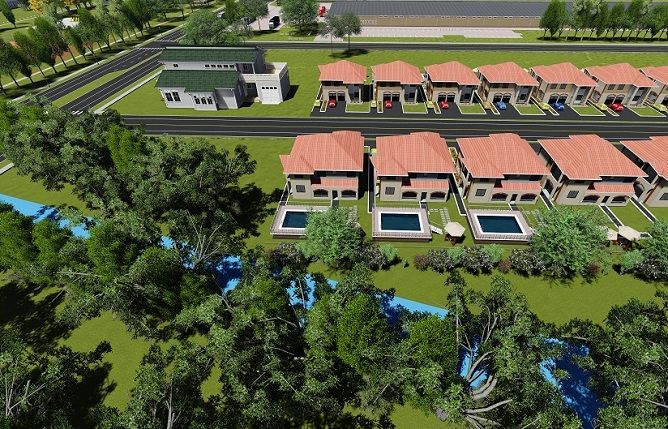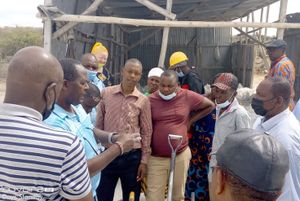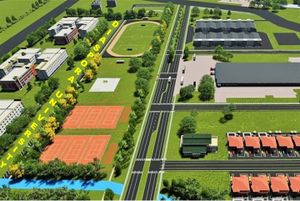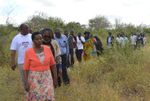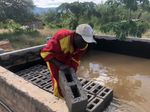“The biggest capital input budget into the Diaspora University Town (DUT) will be the townhouse’s development budget,” says Dan Kamau, DUT Executive Trustee and Director when speaking to Diaspora Kenyans and Kenyans during a zoom meeting. He adds, “The budget for the 6,000 townhouses development plan is Kshs 42 billion.”
During the zoom meeting, he informs the Diaspora Kenyans that the townhouses will be constructed on plots of 50ft by 100ft. He shows the design of the 5 bedrooms and 4 bathrooms townhouse on the plot. He says, “The townhouse is a double house. There is a basic building plan and a house improvement plan. The swimming pool will be in the house improvement.”
Dan explains that the townhouse design and development is based on Kenya Constitution 43 that reads, “(1) Every person has the right— (b) to accessible and adequate housing, and to reasonable standards of sanitation; (d) to clean and safe water in adequate quantities, “and Kenya Constitution 42 that states, “Every person has the right to a clean and healthy environment.”
He says that the Strategic Environmental Assessment (SEA) that was done will ensure a clean and healthy environment. He adds, “The townhouses will have clean water. There will be minimal dust in the town air.”
Speaking on who shall live inside the townhouses developed, Dan says that persons taking up the DUT jobs created will live in the houses. He explains that jobs creation without incorporation of housing leads to slums, poor housing, and a dirty unhealthy environment.
He presents the DUT 20,000 jobs creation plans of Town, University, Hospital, Medicine Vaccine, and over 500 SMEs. He says, “A person taking a job at DUT will be able to meet their economic and social rights of food, healthcare, housing, social security, clean water, clean environment, and children rights.”
Explaining the DUT townhouse development system, Dan states that the developers of the townhouses are individuals through the DUT townhouse developer system. He adds, “An individual can develop one to four units using the DUT system.”
On the jobs and housing connection, Dan shows the Master Development Plan (MDP) integration sustainable system that integrates jobs creation and houses development. To explain this, he gives the example of a Diaspora Kenyan who travels to the U.S, gets a job and lives in a good house. He says, “Jobs and houses go together. This is why in the Kenya constitution the words, ‘right to accessible and adequate housing,’ establish the housing right.”
He tells the potential townhouse developers that the Diaspora University Town development is progressing to create 20,000 jobs. He says, “About 60% of those who take up the 20,000 jobs will settle in the town and create a 30,000 residents’ town with their families.”
He informs those exploring to become DUT townhouse developers that the DUT-MDP uses a Gross Domestic Product (GDP) growth approach. He shows the analysis of the U.S. GDP growth from $57 billion in 1933 to $21 trillion in 2021. He says, “As the new town of DUT with 30,000 residents emerges, a new GDP of Kshs 20 billion will be developed.”
When replying to a question on how one becomes a DUT townhouse developer, Dan says, “The DUT townhouse developer system enables any person to become a townhouse developer through signing a THIDA document and then putting in capital as written in the document.”
He tells the potential developers that DUT is a jobs creation, houses development and GDP growth project. He points out that the DUT system shall progressively create jobs for the estimated, 25 million jobs creation opportunity by 2030. He says, “The system shall develop good houses for the over 6 million houses development opportunity by the year 2030.”
He further explains that the 25 million jobs creation opportunity is a Kshs 25 trillion GDP growth opportunity. The 6 million housing opportunity is a Kshs 30 trillion opportunity. He says, “DUT system shall play a significant role in expanding Kenya GDP from the current $100 billion to $500 billion by 2030.”
He tells the Diaspora Kenyans that the DUT system will progressively turn Diaspora Remittances to become capital for jobs creation and housing development. He estimates that by 2030, in the next 10 years, Diaspora Kenyans will remit about Kshs 4 trillion. He says, “Some of this money will come to Kenya through the DUT systems of job creation, house development, and GDP growth.”
When explaining the source of the Kshs 42 billion finance, Dan shows the Central Bank of Kenya (CBK) balance sheets of all banks for 2015 and 2020. Based on the balance sheets he explains that Kenya banking deposits grew from Kshs 2.5 trillion in 2015 to Kshs 4 trillion in 2020 a growth of Kshs 1.5 trillion. He says this growth led to loan advances that came from the deposits to grow from Kshs 2 trillion to Kshs 2.6 trillion, a growth of Kshs 600 billion.
He says, “By December 2026 when the Kshs 42 billion is added into Diaspora University Town and becomes 6,000 townhouses; the deposits in Kenya Banking shall have grown to over Kshs 6 trillion. The loan advances to over Kshs 5 trillion. The Kshs 42 billion will be part of the deposits and loan advances growth.”
